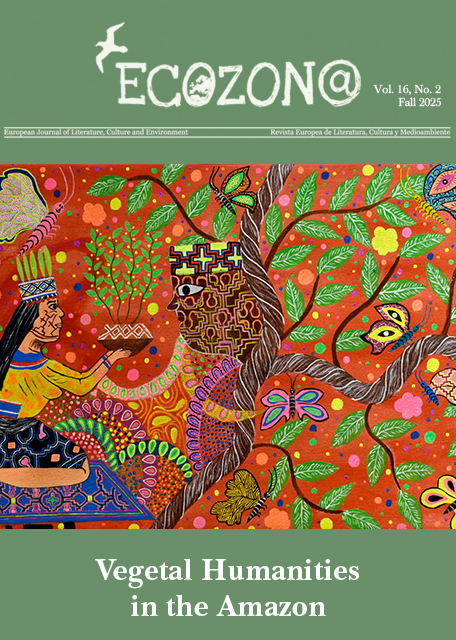“From a certain angle”: Ecothriller Reading and Science Fiction Reading The Swarm and The Rapture
DOI:
https://doi.org/10.37536/ECOZONA.2012.3.2.475Parole chiave:
ecothrillers, science fiction, extrapolation, The Swarm, The Rapture, eco-thriller, ciencia ficción, extrapolaciónAbstract
Read as apocalyptic ecothrillers, Frank Schätzing’s The Swarm and Liz Jensen’s The Rapture do not offer much in the way of critical reflection on the ecocatastrophes they stage. The Swarm’s focus on the feat of confronting the violent efforts of a superintelligent, deep-sea species to protect its ocean habitat against continued human exploitation and The Rapture’s focus on the feat of locating on time the psychically-predicted disaster zone of an impending undersea calamity overshadow their more than occasional spotlighting of, for example, the dangers of methane hydrate mining. Science fiction, however, requires readers to be attentive to those narrative moments when incongruities between the known world and the extrapolated world of the text emerge with critical, not just plot-supporting, purpose. Fundamental to the reading and interpretation of science fiction is the reader’s awareness of the genre’s extrapolative practice, which connects the now with the imagined then and therefore instigates critical thinking about present human practices. Read as extrapolative science fiction, The Swarm and The Rapture gain merit as ecopolitical works, for “science fiction reading” mobilizes the latent ecopolitics of ecothrillers, ecopolitics that “ecothriller reading” would otherwise diminish or fail to notice.
Resumen
Considerados ecothrillers apocalípticos, The Swarm de Frank Schätzing y The Rapture de Liz Jensen no ofrecen mucha reflexión crítica sobre las eco-catástrofes que presentan. The Swarm se centra en los violentos esfuerzos de una especie superinteligente que habita las profundidades para proteger su hábitat marino frente a la continua explotación humana. Por su parte, al centrarse The Rapture en la hazaña de ubicar en el tiempo la zona catastrófica de un desastre submarino inminente que ha sido predicho psicológicamente, se eclipsan las más que ocasionales referencias a, por ejemplo, los peligros de la minería de hidrato de metano. La ciencia ficción, sin embargo, requiere que los lectores estén atentos a esos momentos narrativos en los que las incongruencias entre el mundo conocido y el mundo extrapolado del texto surjan con objetivo crítico, y no sólo para respaldar el argumento. Es fundamental para la lectura y la interpretación de la ciencia ficción la conciencia por parte del lector de la práctica extrapolativa del género, que conecta el ahora con el entonces imaginado, incitando así a reflexionar críticamente sobre el comportamiento humano en la actualidad. Considerados ciencia ficción extrapolativa, The Swarm y The Rapture ganan mérito como obras eco-políticas, porque "la lectura de ciencia ficción" moviliza la eco-política latente de los eco-thrillers – eco-política que en "la lectura de eco-thrillers" de otra forma pasaría desapercibida.
Downloads
##submission.downloads##
##submission.additionalFiles##
Pubblicato
Fascicolo
Sezione
Licenza
Authors who publish with this journal agree to the following terms:
a) Authors retain copyright and grant the journal right of first publication with the work simultaneously licensed under a Creative Commons Attribution License that allows others to share the work with an acknowledgement of the work's authorship and initial publication in this journal (CC BY-NC for articles and CC BY-NC-ND for creative work, unless author requests otherwise.
b) Authors are able to enter into separate, additional contractual arrangements for the non-exclusive distribution of the journal's published version of the work (e.g., post it to an institutional repository or publish it in a book), with an acknowledgement of its initial publication in this journal.
c) Authors are permitted and encouraged to post their work online (e.g., in institutional repositories or on their website) prior to and during the submission process, as it can lead to productive exchanges, as well as earlier and greater citation of published work (See The Effect of Open Access).










